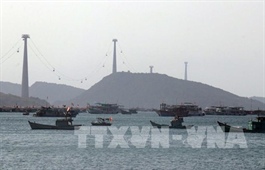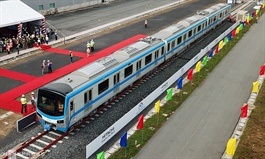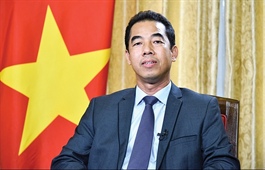Long-term development commitments realised through strategic M&A moves
Long-term development commitments realised through strategic M&A moves
A potential rise in mergers and acquisitions is sparking concerns that local firms will lose competitiveness by selling themselves to foreign investors. However, experts believe that local businesses have more to gain than to lose by striking deals.

Long-term development commitments realised through strategic M&A moves
|
The Vietnamese merger and acquisition (M&A) market has suffered a plunge since the beginning of 2020 as investors took a more cautious tack while restrictions and quarantine measures hindered the evaluation and decision-making of M&A deals.
Such transactions in Vietnam were estimated at $3.5 billion during 2020, accounting for 48.6 per cent compared to the previous year, but it is believed the market will recover this year when its size may return to previous levels of around $5 billion.
Beside other traditionally big investors to Vietnam including those from Singapore, Japan, and South Korea, Thai corporates have showcased great confidence in Vietnam in the midst of the global health crisis.
In one case, Stark Group acquired Thinh Phat Cables JSC and Dong Viet Non-Ferrous Metal and Plastic JSC, while a leading Thai conglomerate SCG bought Bien Hoa Packaging JSC. There have also been a few notable power projects in Vietnam involving Thai investors in the past year such as Banpu Pcl., Super Energy Corporation, and Gunkul Engineering Plc.
These transactions, along with many other M&A deals that have been carried out recently, come with worries that many Vietnamese companies may fall by the wayside in the hands of foreign companies.
However, Ong Tiong Hooi, transaction services partner of PwC Vietnam, told VIR that almost all investments made via Thailand have come through corporates that are looking to expand their value chain either horizontally or vertically into sectors such as beverages, retail, construction, packaging-related materials, and industrial products.
“Generally, all foreign investors regardless of corporate or financial investors look for the same thing: supporting their investee to grow, adding value and synergies to their portfolio of investments, and strengthening and generating financial returns,” he said. “For most Thai buyers, our general observation is that they do understand the general business practices in an emerging country like Vietnam, as most of their countries underwent the same business trajectory before.”
Supercharged competitiveness
Meanwhile, Eric Johnson, senior associate in Vietnam at international law firm Freshfields Bruckhaus Deringer LLP, stated that foreign investment into local Vietnamese businesses should be viewed as a positive trend that increases competition and benefits the domestic business community as a whole.
For example, for founders looking to sell a family-owned business, selling to a foreign investor is an attractive option, and there is still plenty of demand from foreign investors for well-run local businesses.
“For growing Vietnamese companies, funding from a well-known foreign financial investor can provide capital, know-how, and a reputational boost that can supercharge their expansion plans. Of course, too much investment done in the wrong way could freeze out local businesses and actually reduce competition,” Johnson said.
“But the government has plenty of means at its disposal to review foreign investment transactions to guard against this risk, including the new Law on Competition that became effective in 2020,” he added.
Tran Quoc Phuong, Deputy Minister of Planning and Investment, stated that M&A have become an effective capital mobilisation channel, helping to diversify investment sources for the Vietnamese economy, accelerate economic restructuring and renewal of the growth model, and bring variety to the types of business ownership.
“Therefore, the ministry is completing the draft of a new strategy on attracting foreign direct investment with the aim of prioritising high-tech projects and those backed by advanced and clean technologies, with modern governance, and likely to yield high added values, create spill-over effects, ensure technology transfer, and commit to assisting Vietnamese enterprises in joining global production chains,” Phuong said.
SCG is one such example. M&A has become the most effective channel for the company to realise its commitment to long-term investment in the Vietnamese market. At present, SCG boasts 21 subsidiaries in Vietnam focusing on petrochemicals, cement, and building materials, and packaging, many of which have been established via M&A activities. Following the acquisitions, SCG coordinates with companies within its portfolio to foster growth by improving operation and safety standards as well as productivity. SCG’s M&A efforts in Vietnam also reflect its vision to become a regional business leader.
The group has a relentless commitment to driving innovative products, services, and solutions that meet the diverse needs of consumers whilst creating business success in accordance with the circular economy concept to contribute to the sustainable growth of each and every society and community.
Performance boosts
Thanks to its vision, Vietnamese companies have elevated their businesses into higher levels after becoming members of SCG. Typically, Song Gianh Cement JSC has recorded improved business performance after the 100 per cent buyout to SCG. The company also adopted state-of-the-art technology to make innovative products for the market. The new cement products in line with international standards have helped Song Gianh Cement enhance its competitiveness in the market.
Meanwhile, Binh Minh Plastic was honoured as one of Vietnam’s 50 Best-Performing Companies in 2019 by Nhip Cau Dau Tu magazine, in tandem with Thien Viet Securities. Making that the ninth consecutive year in the top 50, Binh Minh Plastic has a consistent performance thanks to excellent corporate governance and strong commitment to quality improvement. The achievement can be attributable to SCG’s efforts to build a sustainable business in line with social and environmental welfare.
Over the past few years, such Vietnamese companies as Binh Minh Plastic are working with deep-pocketed international partners to strengthen their operations. Indeed, Vietnamese companies realise that they can compete globally if they shake hands with foreign investors and combine each other’s resources, creating a larger entity with bigger distribution networks, economies of scale, and more talent at senior levels.
As a result, more and more Vietnamese companies are eager to find the right strategic investors who is keen on their businesses and would accompany them on their development journey, rather than just paying regard to their assets.
M&A is typically carried out in order penetrate markets and leverage the advantages of their partners in a global context; however, deals need proper understanding from both law-makers and businesspeople to grab the best benefits.
And with the international and regional situation remaining complicated and unpredictable in 2021, businesses and investors are changing their way of thinking and taking more drastic action to overcome the difficulties. As a result, more efforts have been made to improve mobilisation and efficient use of resources. As such, according to industry insiders, a reasonable M&A strategy could be a key tool for businesses to conquer the hardship and thrive in a new normal.
























